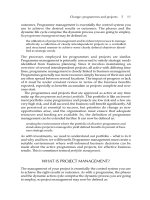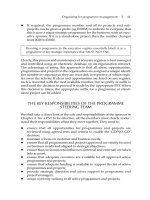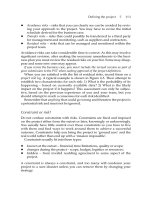50 little things that make a big difference to team motivation and leadership phần 8 potx
Bạn đang xem bản rút gọn của tài liệu. Xem và tải ngay bản đầy đủ của tài liệu tại đây (742.94 KB, 13 trang )
83
teach the subject to others, whether by lecture or by facilitation, then
first you have to teach it to yourself. You will be unlikely to be able to
teach a group successfully about motivating people unless you have the
wherewithal in motivation yourself. It does not happen by
default. Teaching a subject therefore leads you to develop
yourself.
Chris Hughes, previously with the Bradford &
Bingley bank in the UK, invested substantial
amounts in teaching himself. For example,
he spent over £2,000 of his own money
while with the bank to go and hear
the American guru Anthony Robbins
present a seminar. This personal
learning helped put him ahead of the
competition, benefited his
customers, and contributed to his incredible success as a top
performer.
When someone has a thirst for learning, their motivation will often
be so great that they will want to pass on the valuable lessons to other
people. An additional benefit of teaching others is that it subjects your
thinking and approach to severe scrutiny. This can prove to be an
invaluable test of your theories and practices. If there is any weakness in
your argument, it will soon be exposed in a lively session.
THE BIZ STEP 35
Approach your training department and volunteer to run a
motivation program for staff from other departments. If your
company doesn’t have a training department, arrange the session
yourself.
BIZ POINT
What you learn about the biz is valuable.
Teach it so that others can benefit.
Biz 35-39 4/8/04 7:22 AM Page 83
STUDY TEAM MEMBERS
LIKE A BOOK
Study people. The more you do, the
more you will understand and be able to deal with them.
We all have hidden complexities and even facets of our psychological
makeup that we don’t understand ourselves. It helps to have a team
leader who seeks to understand. Those who fail to study people end up
playing with figures and designing metalwork. The latter has to be done,
but if you want to motivate people it is far better to study them than
statistics and science.
It is worth quoting three women from
Singapore on this subject. The first is Doris
Chee, restaurant manager at the Oriental
Hotel. She has it in a nutshell: “You have to
study each team member like a book. You have
to learn about an individual’s strengths and
weaknesses, about each person’s character,
motivations, skills and experiences, thoughts
and feelings as well as the attitude and approach to the exceptionally
high standards we set and expect. Only in that way can you help people
learn and improve.”
She goes on to say, “The more you know an individual the easier it is
to deal with that person.” The logic is irrefutable and it is therefore
surprising that this subject is often so neglected.
Olivia Lum, founder and chief executive of the incredibly successful
Hyflux Company, states: “I learnt early in life from my teachers that
knowledge is power. I am therefore a very inquisitive person. I like to
ask people lots of questions so I can understand what is going on and
what is important.”
The third woman is Nanz Chong-Komo, founder of the ONE.99
shop, who won the International Management Action Award in 2001.
She comments, “I get insights into people’s lives. Fifty percent of
motivation is asking people how they are. Be interested in people first.”
The best minute is the one you invest in learning about a particular
person. In the absence of such study, misunderstandings are likely to
84
Biz 35-39 4/8/04 7:22 AM Page 84
arise and disasters occur as dissensions erode the fabric of morale in the
organization.
The triggers for demotivation are frequently the little things that people
say and do. Studying people therefore involves studying the small stuff: their
microbehaviors, their subtle nuances of attitude, mood, body language, and
eye movement. It means understanding each and every word and the
meaning behind it, false or genuine. It means continually seeking
answers to the question “Why?”—“Why did they behave
like that?” or “Why did they say that?”
Such studies will reveal the reason behind the yawn,
the bored look, the casual throwaway remark, and the
automatic “No, it can’t be done.” They will help you
understand why Jill always rushes to volunteer
while Jack runs a mile to avoid taking any
initiative. You will learn why Jane is always
complaining and Jim is always cheerful.
Bosses who study people and seek
understanding can help them change for the better, should they so
want—and if people don’t want to change, leaders can at least try to
understand why they are sticking their heads in the sand and refusing to
drink at the creek. Perhaps they fear non-existent crocodiles, or the
crocodiles in their minds. In motivating people an excellent boss can
help people wrestle with their fears and overcome them. But it takes a
lot of study to do so. It involves listening and learning as opposed to
telling and teaching.
The secret is to watch, observe, ask, explore, and build up pictures
that reflect a person’s total self: personality, positioning, and approach.
THE BIZ STEP 36
Each day focus on one member of your team, study him or her,
and try to establish what makes this person tick. Learn from this
and then help others learn too.
BIZ POINT
The best bosses are an open book. Everyone
can read them and understand.
85
Biz 35-39 4/8/04 7:22 AM Page 85
DROP PEOPLE IN THE
DEEP END
Help team members prove to themselves
that they are capable of much more.
It is difficult to swim in shallow water. Furthermore, it is impossible to
learn to swim by reading a textbook or attending classroom lectures.
Learning to swim is all about pushing back the boundaries of your
experience, being submerged, getting your head wet. It is also about
eliminating some fairly deep-rooted fears and proving to yourself that
most things are possible. The limits on achievement are mostly the limits
that we artificially construct in our minds in order to protect ourselves.
The worst team leaders allow their people to paddle in shallow
water every day. It is pleasant for a while, but ultimately it becomes
boring. Meanwhile the competition has learnt to
swim in the deep sea and has reached the
other side of the bay.
Many people are happy to paddle
through life and achieve little other than a
degree of comfort—and such comfort can lead to complacency.
The best team leaders are aware that dropping team
members in the deep end from time to time
means that they are more likely to survive than if
they remain protected in the shallow end.
They will have a deeper experience of a
wider range of issues and will be more able
to cope with the pressures of intensifying competition. The deep-end
experience provides many more valuable lessons than the shallow end.
Inevitably there is a high degree of risk in this deep-end experience.
To learn effectively people must take risks and gain from pushing back
boundaries. When risk is minimized the experience and learning are
minimal—and consequently motivation erodes as people become
entrenched in their attitudes and set in their ways. In contrast, dropping
people in the deep end can prove highly motivational, as it sends a clear
signal that the company believes in them and trusts them to take risky
decisions. That’s the biz.
86
Biz 35-39 4/8/04 7:22 AM Page 86
Here are some examples of deep-end experiences into which team
leaders can drop their people. A team member can be:
❖ Invited to present to the board (when normally the team leader does so).
❖ Asked to represent a director in important negotiations with a customer.
❖ Assigned the responsibility of organizing a major event (for example the company’s ten-year
anniversary celebrations).
❖ Asked to deputize for the boss who has been sent on a three-month assignment overseas.
❖ Given a six-figure budget and responsibility for a project to bring a new product to market.
❖ Asked to head up an important new company change initiative.
❖ Plucked out of nowhere and asked to be the chief executive’s personal assistant for three months.
❖ Sent to take charge of the closure of a non-productive factory.
❖ Given two days’ notice to pack and go overseas and hold the fort when a country manager
is suddenly taken ill.
Effectively it means pushing as many people as possible to their limits—so
that they can exceed them and become much more effective as a result.
Dropping people in the deep end is exciting and exhilarating and
many people relish it. It can be like taking the highest bungee jump in
the world. However, it is not for everyone and no matter how much a
team leader passionately believes in giving people these phenomenal
opportunities, there are always some who hold back, who will not take
the risk and prefer to continue with the safety of the mundane. These
people probably do not realize that in the long term they are putting
themselves at risk, as with fewer skills and less experience they become
less marketable than those who have been exposed to and taken
advantage of the deep end.
THE BIZ STEP 37
Create some deep-end experiences for those members of
your team who really have potential to excel in their career. For
example, send them into the lion’s cage to feed the top cats with
some juicy information and proposals.
BIZ POINT
The depth of a person’s mind is a function of their
willingness to take on deep-end experiences.
87
Biz 35-39 4/8/04 7:22 AM Page 87
NURTURE
Take care to help each team member
grow and develop.
It is the little tender touches that motivate people and help them grow.
We are all more delicate than we make out. While we like to simulate
thick skins to protect our self-esteem, most of us are sensitive to the
nuances of other people’s behavior, for example whether or not he
spoke to us or ignored us, whether or not she took an interest in us as
opposed to them, whether or not we were kept in the loop or left out.
Most times we don’t let on. We don’t reveal how we feel and the
impact of other people’s behavior on us. We attempt to conceal our
limitations, vulnerabilities, and deficiencies. If exposed, we fear ridicule
and lack of career progress. Yet paradoxically it is these very things that
need exposure if we are to address them and develop.
This area is fraught with difficulty. It is very subjective and the
exploration of someone’s inner self has the potential to damage their
ego. Through denial we hide from ourselves because there is a part of
us that we want to hide from others—but it is this very part of
ourselves that needs repair and regeneration.
In other words, we all need nurturing if we
are to make progress along the rocky road of
doing our best for the business. Those of us
who are not nurtured either go wild with
extreme behavior, oblivious to the impact on
others, or shrivel up from lack of attention. If
we are not nurtured we are unaware of
ourselves and how others perceive us. We
create an impression of what we want to be and delude ourselves that
this is the impression others have of us. We accept their perception if it
accords with our own self-image and dismiss it if it does not.
Such extreme unnurtured behavior encourages sycophancy, flattery,
hypocrisy, and at its worst a dictatorial style of management. Nobody
can tell unnurtured team leaders anything unless they want to hear it—
and they only want to hear it if it conforms with their own version of
events and their own heroic image of themselves.
88
Biz 35-39 4/8/04 7:22 AM Page 88
Nurturing through coaching and counseling is the answer. In an ideal
world everyone should have a mentor to whom they can turn in order
to talk through the multitude of ambiguities, half-digested thoughts,
worries, and fears that are inevitably inflicted on our delicate souls. We
all need a confidant we can trust with our innermost thoughts and
feelings—no matter how irrational and extreme they are.
The best bosses develop a fine sensibility that enables them to coach
and counsel team members without fear of retribution if they reveal
dark thoughts and extreme tendencies. The mere process of revelation
can enable these thoughts and tendencies to be addressed—
before they become too repressed and thus create the long-
term potential for explosive impact. In this way each rose grows
to be beautiful rather than being allowed to go wild and
strangle others.
When team leaders run around in busy mode putting pressure
on all and sundry, these vital opportunities for nurturing, coaching, and
counseling pass them by. The long-term effect is an erosion of moral
fabric in the organization. A decay sets in, with the consequent failure to
nurture the fine souls who devote their energies to doing the biz.
Nurturing is a precious process with no immediate discernible
benefit, but it is essential. None of us can exist alone. We all need
another person to share our thoughts and help us work through them.
With pressure our thinking becomes both muddy and muddled, with a
resulting lapse in the quality of decision making. Managers need to
demonstrate that they care by nurturing.
THE BIZ STEP 38
If you don’t have one already, seek out a confidant who can
help you develop and grow by listening to you and assisting you
in straightening out your own crooked thinking.
Similarly, develop the skills of a confidant so that you can nurture at
least one other person along the route to success.
BIZ POINT
Uncontrolled nature is wild, but with nurture it
can grow to be beautiful.
89
Biz 35-39 4/8/04 7:22 AM Page 89
SEND TEAM MEMBERS
AWAY
Free up your people’s minds. Ensure
that they are periodically absent from the workplace.
The same old thing day in and day out breeds monotony, demotivation,
and erosion in performance. People cannot contribute effectively if they
are not occasionally freed from their regular routine. They begin to do
things with their eyes shut and this can become dangerous.
If repetitive strain injury comes from tapping the keyboard for hours
on end, repetitive brain injury also comes from processing the same old
thoughts 100 times a day. Such are the scripted welcomes, the
standardized questions, and the rehearsed responses. In the end this
wears people out and no matter how much fun they have at work, they
become exhausted with the exacting procedures and time-limited
transactions that form part of their essential contribution. Instead of
work being enjoyable and exciting, it becomes a chore that at times is
difficult to face.
Such demotivated people absent themselves through sickness, real or
simulated. They change jobs in the hope of new challenges and renewed
interest.
The best team leaders don’t allow their people to be
worn out by the treadmill of everyday routine. They
create temporary escape routes so that people can
venture out and reenergize and improve themselves
with new freedoms. As the cliché goes, “A change is
as good as a rest.”
The most highly prized form of absence from
routine is an international trip. This frees up an
individual to learn afresh and make an exciting new
contribution. While it is expensive, foreign travel on
an important project can prove to be a major
investment in motivation. The benefit from
company-sponsored international travel is immeasurable and everyone
should be given the opportunity from time to time. It will broaden
horizons and alter entrenched, institutionalized thinking. The company’s
90
Biz 35-39 4/8/04 7:22 AM Page 90
culture will really buzz when people are given such opportunities. They
will return with stories to tell that will whet their colleagues’
motivational appetites.
Another valued form of absence is external training. Giving
employees the freedom to be exposed to people
from other companies as well as to experts
expands their horizons.
Exchange visits can also be helpful. For
example, head office staff should make field visits
from time to time to experience reality. By the
same token, field staff should visit head office to
experience finality (this is where the buck stops).
Similarly, call center staff should be free
occasionally to go and see the people who call
them, to get to know what it feels like to be at
the other end of the phone and the experiences
that callers go through.
On a daily basis, this means taking a breath of fresh air, walking
around the park with members of your team, or hopping over to Caffè
Nero for a grand latte and a chat. Why not send your people to the pub
for lunch on the last Friday of every week to brainstorm some great
ideas?
Unless you send your people away they will turn into robots who
mechanistically go through the same old routines every day. Everyone
needs to be extracted from their environment from time to time and
exposed to new ideas, thoughts, and practices.
THE BIZ STEP 39
Ensure that every team member is sent away from the
workplace at least twice a year (in addition to their normal
vacations). Plan it now and make it happen.
BIZ POINT
Even at work we need the freedom to be home
and away.
91
Biz 35-39 4/8/04 7:22 AM Page 91
Biz 35-39 4/8/04 7:22 AM Page 92
THE SIX BIZ MINDSETS
The prime mindset for any effective team leader is to make people the
top priority. However, there are a number of other interrelated
mindsets that are required to support this approach and do the biz.
Perhaps 75 percent of a team leader’s time, energy, and thinking
should be devoted to people issues. The remaining 25 percent should
be assigned to all the little things needed to apply the remaining five
mindsets, all of which overlap to some degree.
40 First mindset: People
41 Second mindset: Customers
42 Third mindset: Money
43 Fourth mindset: Positivity
44 Fifth mindset: 110% attitude
45 Sixth mindset: Be M.A.D.
Biz 40-45 4/8/04 7:22 AM Page 93
94
FIRST MINDSET: PEOPLE
In doing the biz the first thing that
should be on your mind is people.
On the very first day and during the very first hour after John Hayes
took up his appointment as managing director of the John Lewis
department store in Newcastle, UK, he was there at the partners’
(employees’) entrance to welcome everyone who worked in the store.
He was thinking about his new team and he was there for them from
that very first moment. He spent most of his first day on the shop floor,
meeting people, listening carefully, and finding out what they thought.
Too many bosses are nowhere to be seen. They are distant. They
spend their time in meetings, leaving front-line employees unaware of
what is going on.
In fact, the only time you see some managers is when things go
wrong—and then they are there to find fault, to criticize, to punish, and
to instruct on a better way. These bosses always know a better way—
after the event. They are driven by hindsight and specialize in reacting
to the negative. They are experts in poor performance and the
inevitable lapses in operational efficiency (which happen inevitably when
they are not around).
The best team leaders “think people” all
the time. They are conscious of the
importance of team members and are
therefore always considering different little
ways to please them, help them improve
their performance, and generally keep
them motivated so that they go home at
the end of the week with a sense of
accomplishment.
What goes on in the minds of the best
bosses is closely linked to the way they feel. They are emotionally
intelligent and are conscious not only of the feelings of each team
member but also of their own emotions. They are aware of the
emotional dynamics in the team and the driving forces that propel their
people forward.
Biz 40-45 4/8/04 7:22 AM Page 94
95
In giving a great deal of time to the people side of the biz, good
leaders focus their minds on effective communication. They know that
the little things they say as bosses can make a big difference. So they
give a lot of thought to the words they use, their tone of voice, and
how best to give feedback. It is a two-
way process, so they also give a lot of
thought to what team members
say to them. They are keen to
listen to their ideas, conscious
that they have a high regard for
team members and trust them
implicitly.
They will also spend hours
thinking through the ins and outs
of the type of people they should
be hiring, the best training to give team
members, and the most effective
way of communicating with them.
Desperate for their people to
succeed, these team leaders will apply
a lot of mental energy to thinking about
how best to support and help them in their endeavors.
Finally, they give a lot of thought to how to recognize and reward
their people’s hard work and the essentials they deliver. The last thing
they want is for people to complain that they don’t feel appreciated or
valued.
THE BIZ STEP 40
Consciously devote time every day to thinking about the
motivation of your team and what else you can do to foster it.
BIZ POINT
The best managers are there for their people.
Biz 40-45 4/8/04 7:22 AM Page 95









